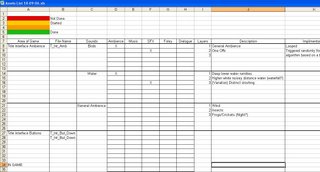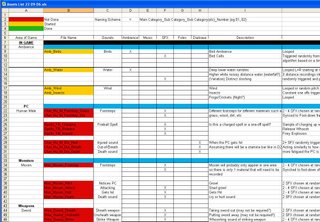- Practical 1 - Audio Arts - Roles, Process & Planning [1]
I have converted my asset list to an excel file. As I receive further information about the game, and as I figure out more intuitive ways of representing this information, expect the format of the spreadsheet to change.
 Download
Download - Asset list 18-09-06
This week we talked about dependencies which are basically tasks that need to be finished before other tasks can begin. In other words, I can't start working on 'B' until 'A' is finished. For example, I can't start working on the weapon SFX until I know what sort of weapons we'll be using. Well like a lot of audio assets, I can start working on them, but I will run the risk of not knowing if they'll be useful or not until the final word has gone through. Screenshots, game footage, reference sketches, and whatever else that may aid me in creating the audio experience can be useful, but there are no set minimum requirements. I guess I'm ready to start when I feel I have a solid enough idea of where I'm going. Fortunately my group and Director Adam Dobson have been very good at providing me material. Adam has so far got me working on the title screen ambience and interface button SFX. The title screen will have a looping movie of animated scene from the game world, and my job will be to add corresponding ambience and music to this backdrop. In the foreground will be title interface the player will need to navigate through to start the game. This interface will need a number of sound effects for the buttons.
Our group also has a forum now where we discuss and post everything related to the development of Manadon. This forum can be accessed
here- Practical 2 - Creative Computing - HID [2]
TTTTTTTTTTTTTTTTTTTTTTTTTTTTTTTT.
- Music Technology Forum - Presentation - Presentations by Poppi Doser, Joshua Schulz, Albert Webster, and Tyrell Blackburn. [3]
Poppi Doser - Various AV
Poppi presented some of her hip hop/musique concrete AV projects. I was very impressed by her work and It's it's a pitty she dosn't present as much as she creates. It's nice to see her improve year by year though. I particularaly liked her 'early rap' (as she calls it) piece.
Joshua Schulz - "*MUSIC CONCRETE PIECE*"
I really liked this piece. It sounded very processed, but well sculptured. I thought Joshua's use of panning was one of the best executed this whole year. My only critism is that through the thick soundscape, there was little room for silence. I felt very engulfed with tension, but the music provided me with little 'release'.
Albert Webster – "BAND RECORDING"
Albert presented us with an ear opening extravaganza. For his presentation he presented one of the tracks he recorded for a Jazz band here at the Uni. I was very impressed with the clarity and seperation of the instruments and the overal mix sounded very professional. I think I'd feel very safe to have Albert record my own band if I had one. The solo instruments tended to be louder than the other instruments which is normal, but personally I would have probably turned them down by a couple of decibels.
Myself – Some game audio for Sillhouette Studios
I'd just like to reiterate to everyone reading this that the music I presented was far from complete. In fact to show some 'unfinished work' was my intention as I wanted to draw the audience deeper into the creation process, although perhaps I should have talked about that more. William made some good suggestions. Firstly he said that I should have showed the movie of "Mysitic Past" (the RPG (Role Playing Game)) that that gave me. It's a good idea in one way, but when I think about it I'd rather not present it as they used my music for this particular movie without my permission, and so it dosn't fit very well from a film point of view. Had they asked me I would have written specifically for the movie, but anyway, moving along. Secondly William suggested I show them the open Cubase session of the pieces I played. That's a great idea, and I probably could have done it on one of the G5's from the mac lab, but I wouldn't be able to play it in real-time unless I brought my own computer in, and without a car, the viability of this is almost 'nil'. Lastly he suggested I show the images as a slidshow within OSX. A good idea, and one that I shall employ if I were given a similar opportunity in the future.
- Music Technology Forum - Workshop - Improvisation Groups!
This week out group seemed more detatched than last week, but we are getting quicker at setup times. Seb made a good comment to me that he thinks the groups are too big. I think he's right, and this probalby has a lot to do with the obstacles we are encountering. I groups of 3 or 4 would work much better. Aside from this I think the imprisation group needs some 'structure', because so far it's been unlike the chaotic excursions of sound I have attended in the past. Perhaps week by week rules can slowly be added and altered until we come to something that is refined, but still improvised
For example,
RULE 1:
We must all create the soundscape to a randomly chosen film or video game played in real-time every week. We can each be assigned roles such as sound design, music, ambience, dialogue, etc.. From there we improvise the audio experience of the film or video game.
RULE 2:
Silence must be employed by certain people at certain times
RULE 3:
Only certain frequency ranges or tempered notes are allowed to be expressed at given points along the timeline of our improvisation.
... etc etc...
It’s still improvisation, but within rules. The concept of improvisation through rules sounds like something much more fulfilling to me than just making choatic sound. Chaotic sound can be good, but this avenue appeals to me more at this stage in my life.
[1] Haines, Christian. 2006. Lecture on Game Audio. University of Adelaide, 29 August.
[2] Haines, Christian. 2006. Lecture on SuperCollider. University of Adelaide, 31 August.
[3] Doser, Poppi. Schulz, Joshua. Webster, Albert. Blackburn, Tyrell. 2006. Student Presentations. University of Adelaide, 31 August.



